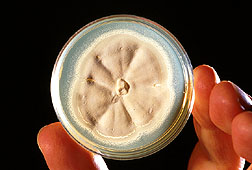This page has been archived and is being provided for reference purposes only. The page is no longer being updated, and therefore, links on the page may be invalid.
Fungi Thwart Two Major Insect PestsBy Hank BeckerSeptember 7, 1999 Natural fungi may help rein in important insect pests of vegetable and cereal crops like broccoli and wheat. Agricultural Research Service entomologist John D. Vandenberg has been focusing on whether two parasitic fungi--Beauveria bassiana and Paecilomyces fumosoroseus--could become biological controls for diamondback moths and Russian wheat aphids. The aphid is a major pest of U.S. winter wheat and barley. Since invading the United States about 1986, the green, 1/16-inch-long pests have cost growers more than $850 million in insecticide treatments, crop yield losses and other costs. The diamondback moth is a worldwide pest of cabbage, broccoli, canola and other crucifers. Each year, farmers worldwide spend more than $1 billion to control it--primarily with chemical insecticides. But in many areas the moth has become resistant to conventional insecticides as well as natural bacterial controls like Bacillus thuringiensis (Bt). Vandenberg has conducted laboratory and field tests that show the moth succumbs to both fungi. But only Beauveria had consistent impact on the aphid in the field. Vandenberg works at the U.S. Plant, Soil, and Nutrition Laboratory operated in Ithaca, N.Y., by ARS, the chief research agency of the U.S. Department of Agriculture. Vanderberg and colleagues were the first to field test Mycotrol, a commercial formulation of B. bassiana, against the diamondback moth. Weekly or twice-weekly applications significantly reduced insect populations and damage to seedlings compared to chemical controls. Other scientists have shown that different strains of B. bassiana work against the Russian wheat aphid in the lab. But this is the first report of Mycotrol's effectiveness against this aphid in the field. Mycotrol was first developed to combat silverleaf whiteflies through a cooperative research and development agreement between ARS and Mycotech Corp. of Butte, Mont. For more details, see the story in the September issue of Agricultural Research magazine and on the web at: /is/AR/archive/sep99/fungi0999.htm Scientific contact: John D. Vandenberg, ARS U.S. Plant, Soil, and Nutrition Laboratory, Ithaca, N.Y., phone (607) 255-2456, fax (607) 255-1132, jdv3@cornell.edu. |

